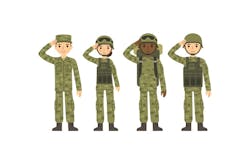Making Military Veterans a Solution to Workforce Struggles
On Nov. 6, 2016, Rich Lawson had a day to remember.
At the Texas Motor Speedway in Fort Worth, Texas, the estimator from Portsmouth, Va., rubbed elbows with Richard Petty. He met 2016 Sprint Cup Series rookie of the year Chase Elliott. And, he rode in a pace car for two laps prior to the AAA Texas 500, as it ripped around the track at nearly 100 mph.
The U.S. Naval veteran, who grew up around rabid racing fans, was elated that day, as he was one of 10 veterans currently working in the collision repair industry to be honored by 3M’s automotive aftermarket division.
“I told my dad, we had gone to so many races to watch the show, and that day we were part of the show,” Lawson says.
That day, Lawson reflected on all he had been through over the last decade, starting with two tours overseas, where he served during conflicts such as Operation Iraqi Freedom, and including nearly a year spent searching for a job once he had retired from the Navy. The joy Lawson felt that day is something he wished he could share with his old shipmates, many of whom have spent years searching for solid work.
As Lawson knows, transitioning from military life to civilian life—and finding a solid post-military career in the process—can be quite tough. He wishes more veterans could find a few lucky breaks like he did, when he landed a job at a Rick Hendrick Collision Center in Portsmouth. Lawson knows that shop owners who hire veterans typically add dependable leaders, with a solid sense of responsibility (plus, shops can get tax credits, as noted in the accompanying sidebar).
“I definitely struggled to find work,” Lawson says. “It can be very discouraging. … There’s no real natural bridge for the gap from [military life] to where I am now.”
Fortunately for veterans interested in working in collision repair, there are organizations eager to bridge that gap.
Surprising Statistics
In recent years, veteran unemployment figures have improved, but remain eye-opening. In 2016, the unemployment rate among male veterans in the 18–24 age range stood at 4 percent, and the unemployment rate among all veterans was at 4.2 percent (overall unemployment in the U.S. was at 4.9 percent by late 2016).
Those statistics don’t sit well with Sean Huurman, Service King’s chief human resources officer.
“We haven’t done a good job of really connecting the dots, as organizations, on what we can do to help [veterans] on this side of the equation, to be ready for their next stage in life,” he says.
Multiple companies in the collision repair industry are making concerted efforts to help military veterans with regard to employment, though. Service King, for example, created a veteran hiring initiative called Mission 2 Hire, in which the company aims to hire 500 military vets and spouses over a five-year period. Similarly, 3M works with the U.S. Chamber of Commerce’s “Hire Our Heroes” campaign in an effort to drive the employment of veterans and their families.
“These are people that are coming out with a tremendous amount of skill, a tremendous amount of knowledge that can be utilized in the private sector,” Huurman says. “It’s incredible the amount of training and development hours that are spent” on the military.”
Veterans’ leadership, respect for the chain of command, and ability to work within a team dynamic also make them ideal employees, he says.
Emory Davis, collision center director at Dale Earnhardt Jr. Chevrolet in Tallahassee, Fla., says military veterans typically make for employees that are especially driven.
“They’re very punctual,” says Davis, whose shop has earned a reputation for giving veterans employment opportunities. “They’re definitely time-driven—it’s instilled in them.”
In Huurman’s time with Service King, the company has found that the skills of military veterans often translate well to roles as service advisors, general managers, or especially body technicians.
“We find that transitioning military and veterans make fantastic body technicians,” Huurman says. “Many of them received training on various aspects that translate very well to the body technician role. And, if given the opportunity to receive some fine-tuned training as it relates to collision repair, that transition can happen very quickly.”
Taking Advantage of Tax Credits
Shops that hire eligible, unemployed veterans can earn tax credits through the Work Opportunity Tax Credit (WOTC) program. Here are key elements to keep in mind for employers aiming to take advantage of the program.
SOURCE: The U.S. Department of Labor
- The WOTC is a federal tax credit available to all private-sector businesses.
- Employers are eligible to participate in the WOTC program if they pay Federal Unemployment Tax Act (FUTA) taxes to the IRS each year.
- Employers must hire a new individual to be eligible to claim the tax credit.
- An employer can’t claim a tax credit for the same employee in consecutive years.
- Employer must ensure that an application is submitted to his/her State Workforce Agency (SWA) no later than 28 calendar days after the new hire’s start date.
- A step-by-step instruction sheet for filling out the necessary certification request/application forms can be found at: fenderbender.com/submittingapp
For more information, visit doleta.gov/wotc (where employers can click on “State WOTC Coordinators” on the left rail and then click on their state to find their state’s WOTC coordinator) or irs.gov. The Department of Labor also encourages employers to contact their state workforce agency with specific WOTC questions.
Tracking them Down
There are many resources that companies can tap to find solid, skilled veteran employees, Huurman notes, on both the state and national level. He recently spoke with the Texas Veterans Commission, for example, and was told an unsettling story.
“They were talking about employers, and the ability to match employers up with veterans,” Huurman recalls. “And there’s literally money that’s available for subsidies and other things that these organizations have at their access that they’re not able to give away, because employers simply aren’t taking advantage.”
Huurman has plenty of tips for employers who are motivated to use all available resources to find ideal veteran job candidates. Among them:
Build relationships with veterans organizations. Forge connections with organizations like the aforementioned statewide veterans association, or even Employer Support of The Guard and Reserve (ESGR) branches, in an effort to find quality job prospects with military backgrounds.
Begin a military hiring program. The Center for America, a 501(c)(3) organization, advocates the implementation of such a setup, which includes involving employees with military experience to help attract veterans, and leveraging your business’s social media channels to attract veteran candidates.
Consider starting a mentoring program. Such an initiative can offer military veterans information about the collision repair industry and the positions it typically has available. Ideally, a mentor can guide their mentee toward a shop with a need. Ryder has used this in the trucking industry and gained positive recognition for its efforts.
Consider apprenticeship programs. An apprenticeship program can help ease veterans into body shop life, and allow time for addressing a lack of job-specific training, without the added pressure to quickly get up to speed in a full-time role.
Ask probing questions during job interviews. Once you’ve tracked down veteran job applicants, it’s important to ask questions that fully gauge their expertise.
“Employers don’t necessarily know what questions to ask,” Huurman says, “to connect the dots between the training [and what] someone was responsible for while they were serving, and how that can translate into what we’re doing.”
Huurman suggests asking veteran job applicants to explain what experience they have repairing large equipment; what leadership or management experience they have; and also to describe any certifications they have earned.
A Dual Solution
Ultimately, Huurman feels the powers-that-be in industries like the collision repair field need to band together in an effort to end veteran unemployment. After all, he’s tired of hearing stories like those from Lawson, the Naval veteran and current estimator.
“There’s still a bunch of people I served with—and it’s been over six years now—that are still struggling to find good, full-time jobs,” Lawson says.
Huurman feels the collision repair industry could be an ideal landing spot for veterans.
“We have such a diverse set of opportunities for people,” Huurman says. “So there’s no reason why we shouldn’t be a preferred industry for folks that are coming out of the military.”
Calling in Reinforcements
If you want to make a difference by hiring military veterans but aren’t sure where to turn, here are some resources that can offer assistance:
The American Legion. This veterans organization hosts countless career fairs throughout the nation throughout the year. (legion.org)
RecruitMilitary.com. RecruitMilitary often works with collision repair businesses to assist their recruitment of quality veteran talent.
Military.com. This site also aims to help veterans find solid employment. Job ads can be posted rather easily.

